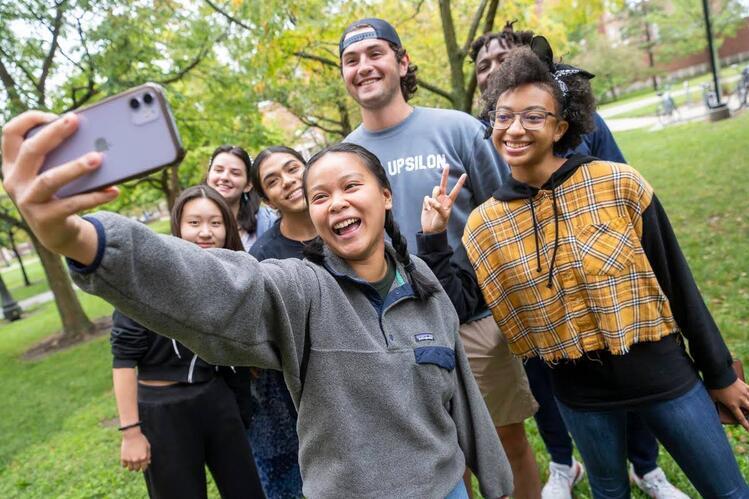ACES prioritizes diversity, equity, and inclusion with dedicated office

For Elizabeth Olson, ACES associate dean for diversity, equity, and inclusion, DEI is much more than a trend or a catchphrase; it means sustained, intentional, data-driven work that appreciably benefits all ACES students, faculty, staff, alumni, and community partners.
“ACES is a great college to be a part of,” she said. “We just need to ensure that is true for everyone, regardless of identity, background, and experiences.”
Dean Germán Bollero initiated the Office of DEI (ODEI) in ACES in the summer of 2023 and sponsored a call to hire an inaugural associate dean to lead the office. The position was designed to energize the college’s DEI efforts through an action plan to advance training, recruitment, engagement, and support of all DEI work.
Olson stepped into the role in January 2024. With a multidisciplinary background in psychology, sociology, social work, and family science, she has long been engaged in DEI work as a practitioner, educator, and research faculty member. Transitioning into an administrative role means she’s excited to manifest meaningful systemic changes beyond her own scholarly work and teaching responsibilities.
DEI is good for ACES
Olson points to the increasing diversity in the U.S. population; census data shows that younger generations are more racially diverse and report greater variability in terms of gender identity, sexual orientation, and even religious affiliation. She says these examples of shifting demographic trends highlight the importance of being aware of the diverse needs and contributions of individuals in our society.
However, most institutions of higher education, including the University of Illinois Urbana-Champaign, do not yet reflect the rise of historically underrepresented minority groups in their students, faculty, or staff.
Inviting diversity is not just the right thing to do, Olson says. “While DEI work may simply be seen as a personal moral decision to support diverse groups of individuals, it is, in fact, an institutional advantage as well,” she said. “Diversification of identities adds value by increasing perspectives and unique contributions to any initiative.”
Studies indicate that diverse teams are more productive, creative, and innovative and make higher-quality decisions. Further, academic papers and grant proposals authored by more diverse teams are more likely to be successful. Students work better and gain a more comprehensive understanding of content, and feel better prepared for employment when taught in diverse classrooms.
“As a college, we should embrace the value that comes from bringing diverse perspectives into the conversation; knowledge advancement will rise tenfold by increasing the diversity of experiences and insights provided by diverse communities.
“However, bringing diverse groups of individuals into communities that do not actively and intentionally welcome, respect, and listen to them (i.e., inclusion) will not retain those individuals. We also cannot include diverse groups of individuals without correcting harms of the past and creating present-day access and opportunities for those who have historically been denied (i.e., equity),” Olson added. “This is why DEI work, in all its forms, is important.”
A data-driven approach
Olson has spent her first months on the job listening to and engaging with individuals and groups such as department and college DEI committees, college leaders, and collaborators across campus to develop the first draft of an ODEI action plan. Broadly, the comprehensive plan is designed to provide support for students, faculty, and staff representing diverse identities and to enhance capacity for social justice and equity work through resource building and educational programming.
Data from the first-ever campus climate survey will help to shape the plan, by highlighting issues that should be prioritized in the college. This fall, Olson will release her plan and begin implementing it. Importantly, metrics and benchmarks will be published for transparency and accountability for the office and everyone engaged in DEI work across the college.
“We will use empirical research to evaluate the state of diversity, equity, and inclusion in the college, implement best practices to enhance each of these missions, and evaluate the efficacy of our efforts,” Olson said.
DEI work is for everyone
Olson has no intention of doing this work alone.
“While it is immensely beneficial for ACES to have a centralized Office of DEI to lead, support, and engage in these endeavors, DEI is everyone’s work,” Olson said. “These values and driving goals should underlie research and scholarly activities, academic programming and student supports, advancement and development, as well as daily staff activities across the college.”
Each ACES department has its own DEI committee, in addition to the college-wide committee. These groups have hosted trainings, provided resources, built connections across campus and with external institutions, and initiated incentive programs to increase faculty DEI activities. Even with all of this good work, Olson says DEI efforts aren’t sustainable without accountability, infrastructure, and resources.
“This work is more than just talk. And in order to walk the walk, it requires tangible supports,” she said.
Make a contribution to advance ACES' DEI initiatives online at aces.illinois.edu/give and include "ACES Diversity, Equity and Inclusion General Fund - 342897" in the "Other" field. To explore other giving opportunities, contact the Office of Advancement at 217-333-9355 or acesadvancement@illinois.edu.